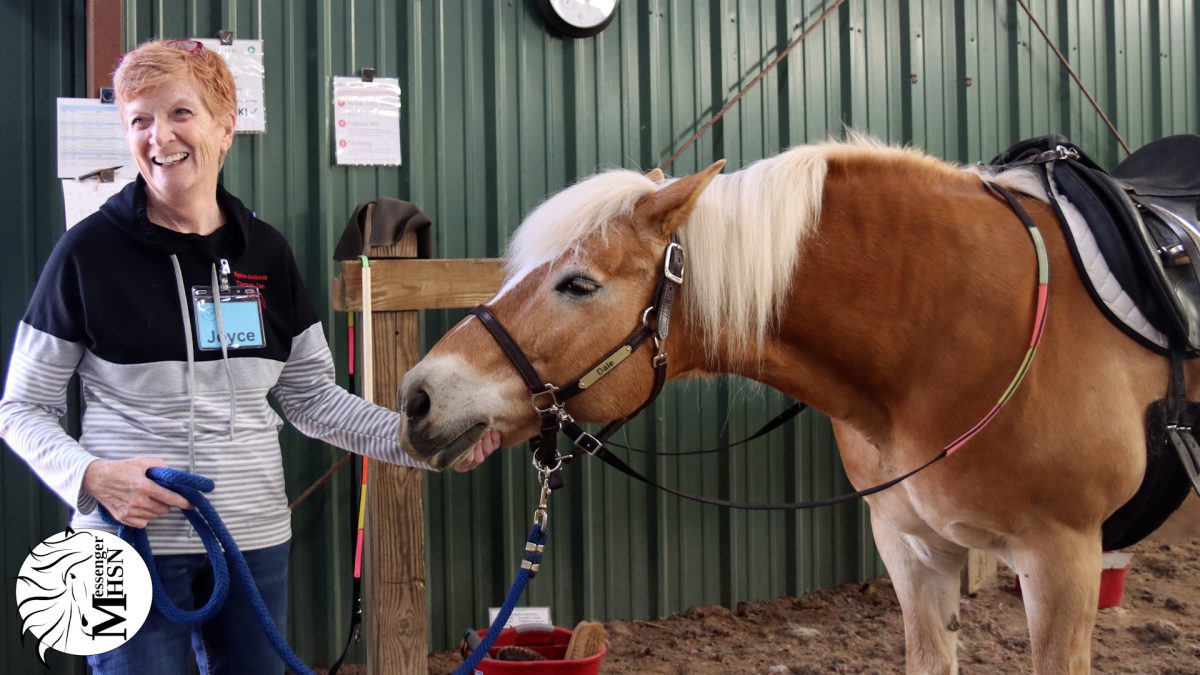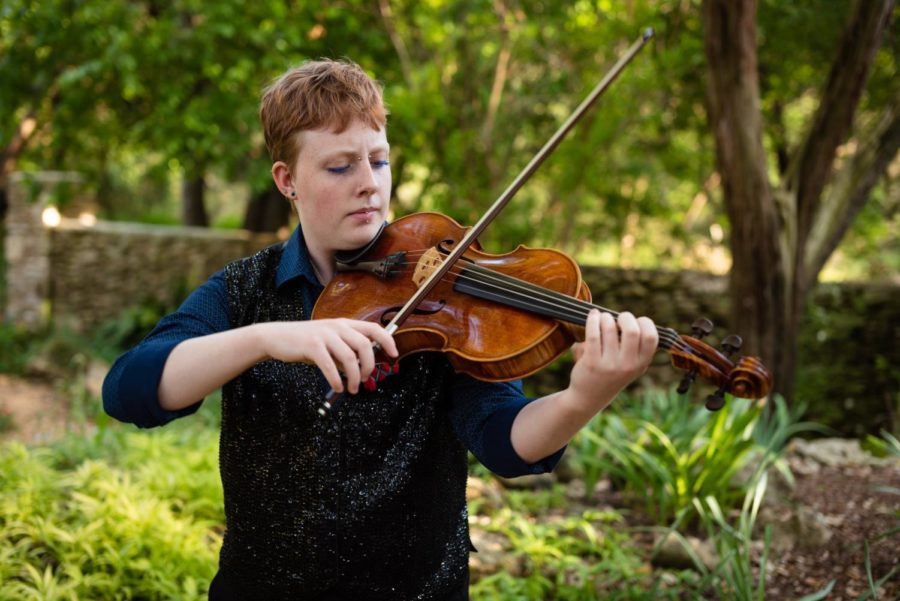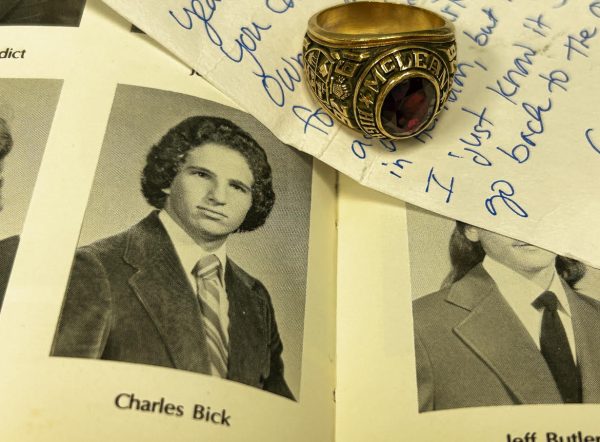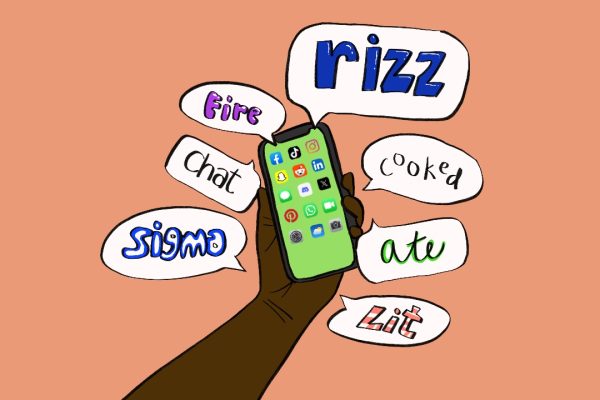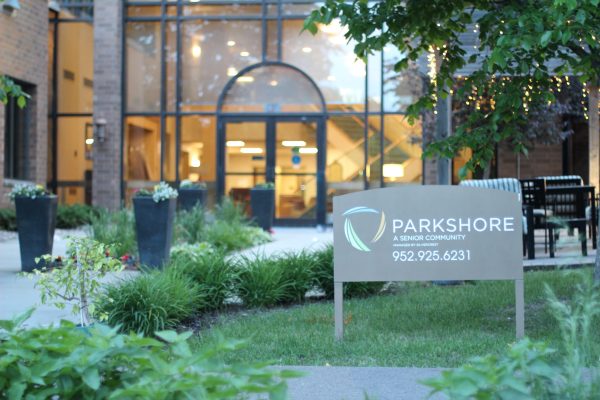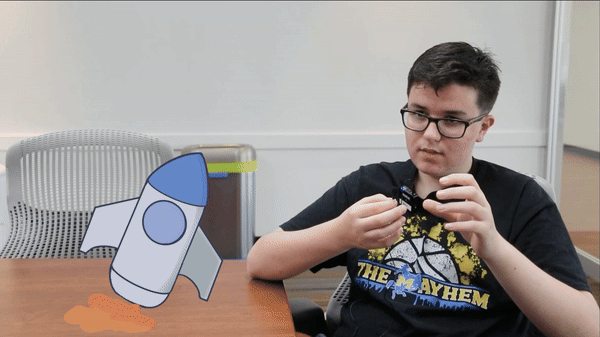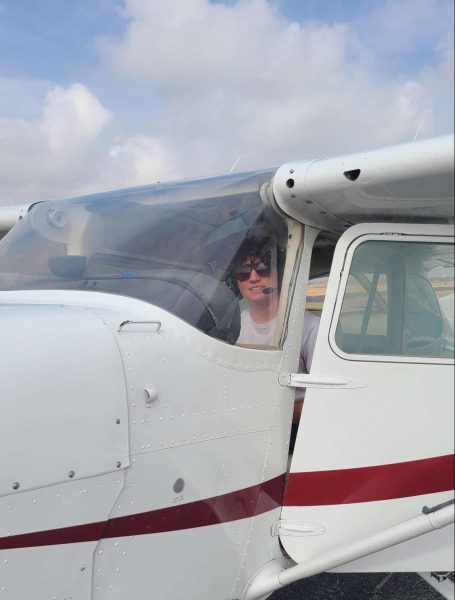From A to Z
Senior violist inspires, breaks barriers
Photo courtesy of Z Campbell
Campbell plays viola for their senior portrait. This fall, Campbell will attend Oberlin Conservatory where they will study viola. With classes on everything from chamber music to music theory available, Campbell believes that Oberlin will allow them to grow as a musician and person.
May 24, 2023
Everyone in orchestra knows: if you’re lost during a concert, just watch senior violist Z Campbell. Chances are, the audience is looking in their direction already.
On and off stage, Campbell is unapologetically themself—a vibrant individual whose vivid self-expression is seen in their appearance and heard through their music. For Campbell, high school has been all about discovering their identity, both as a person and as a musician. From COVID to college applications, viola was Campbell’s lifeline. Now, music is their connection to the world.
When I’m performing, I feel on top of the world.
— Z Campbell
“When I’m performing, I feel on top of the world,” Campbell said. “It’s so cool to just look out and see people and be like, ‘they are connecting with me, and I’m about to do something that will make them happy.’”
According to orchestra director Ricky Pringle, Campbell is one of the best musicians to ever come through McCallum. From sixth grade to senior year, Campbell was viola section leader for the Region 18 Orchestra. They made the top All-State orchestra—a feat accomplished by only two violists in McCallum history—all four years of high school. This summer, Campbell will join the National Youth Orchestra and gain experience as a touring performer.
“I think some kids can look at a Z and say, ‘Well, I want to do that, or I want to be like that or I want to work to have this,’” Pringle said. “Probably the other violas would not be where they are, or as good as they are, had Z not been here.”
Experiencing the classical music world for the first time, Campbell noticed convention that felt stifling. At 6 years old, they watched the Austin Symphony surrounded by old white men as far as the eye could see. In middle school, Campbell realized orchestras were dictated by centuries-old traditions. And when it came to concert black, there was no gray area. Girls wore long dresses and boys wore suits. Dyed hair was unacceptable. That’s just how it always was, but Campbell’s mind screamed it didn’t have to be.
The other violas would not be where they are, or as good as they are, had Z not been here.
— orchestra director Ricky Pringle
“A big piece of my musical journey that’s important to me going forward is that we make [classical music] accessible, and part of that is being accepting of all different types of people,” Campbell said. “Who they are really doesn’t matter. So many different people can enjoy the same music regardless of their differences.”
When COVID hit and viola went virtual, Campbell felt freed from the clutches of classical music conformity. So they began experimenting with their appearance. First, they shaved their head, a rock star ritual to symbolize new beginnings. They dyed it every color they couldn’t before: neon green, bright red, electric blue. They pierced their nose, pierced their eyebrow, pierced their lip. They adopted they/them pronouns and the name “Z.” This was the real Campbell.
“Being able to look the way I want to look and not care about what other people think has definitely transferred into my playing and just being more confident in general, being able to get up on stage and feel good in what I’m wearing and who I am,” Campbell said. “It has definitely made me more expressive, more connected to my emotions and my experiences in a way that’s definitely helped me channel that into my music.”
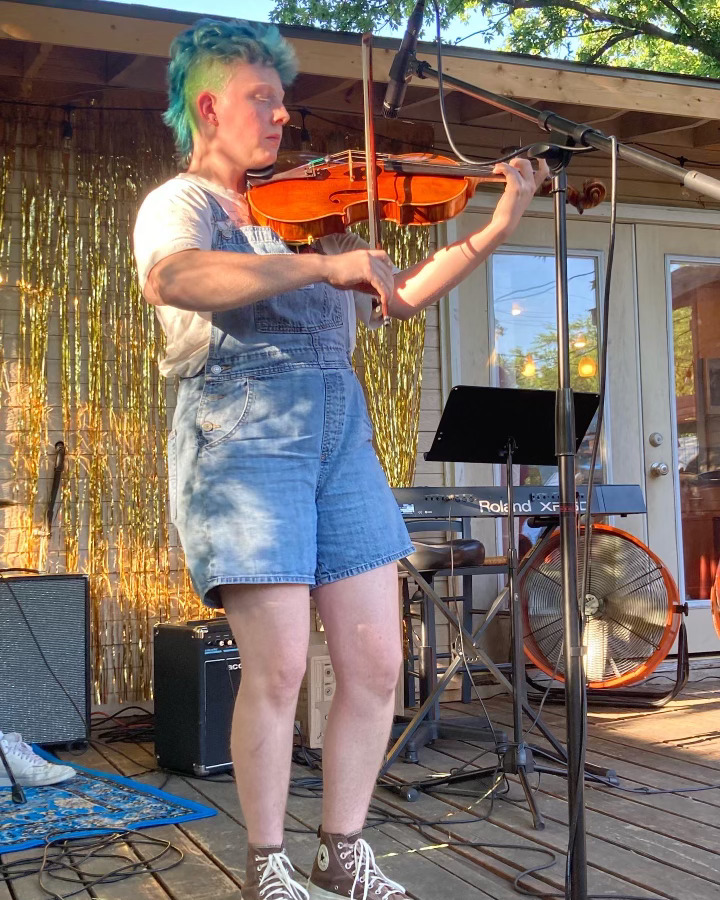
To senior violinist Thea Krische, Campbell is an inspiration. Throughout their four years in a quartet together, Krische has watched Campbell both play and live with passion. Campbell stomps all over stereotypes and uplifts every ensemble they play in. Campbell’s authenticity has pushed Krische to become her truest self.
“Seeing Z come out, it just really shows you, ‘Hey, there is a space for people like us in the classical world,’” Krische said. “We don’t have to fit one mold. I think a lot of people have this idea of orchestra that we’re some stuffy group of people who only ever play Mozart, and I think Z really defies those norms. They’ll show up with a cropped head of bright red hair wearing a bright green button up and they’ll play a tango, they’ll play some Texas fiddle. They’re a rock star.”
Being able to look the way I want to look and not care about what other people think has definitely transferred into my playing and just being more confident in general.
— Z Campbell
“Keep Austin Weird” rings true at McCallum, with its vast array of fashion choices and open-minded culture making it hard to pinpoint the ‘norm.’ But on stage, Campbell knows they stick out. Two years ago, Campbell heard they were likely the first nonbinary person to earn a top-five viola chair in the All-State orchestra.
“I walk into a room, and I definitely don’t fit in,” Campbell said. “It can be a little intimidating, and I feel like I really try not to let it get to me. But it is weird to be that person, especially when interacting with older people and adults that are in the classical music world. There’s not a lot of space for somebody who is just wildly self-expressive.”
For Campbell, viola had always been a vessel for self-expression, where fiddle music let their fingers fly and jazz improv let their creativity flow. They chased after musical challenges in every form, from playing viola in a jazz fusion band called Uncle Approved to joining non-varsity orchestra to learn bass.
“It’s really important to me that I bring a new, fresh energy and perspective to the classical world,” Campbell said. “I just feel like any well-rounded musician will hopefully have experience in lots of different types of music and types of ensembles and collaborative things. Because if you limit yourself, all it does is restrict you and your musical development. And I think there’s a lot from these other types of music that can be applied to classical music.”
Campbell spent last summer at the Green Mountain Chamber Music Festival in Vermont, mastering quartet repertoire under the guidance of world-class instructors. Surrounded by other passionate string players, including a few nonbinary graduate students, Campbell felt truly seen for the first time. As emotions traveled through strings, musical stories passing from one queer musician to another, Campbell knew there was a place for them in music.
They will succeed because I don’t think Z is stoppable. It’s an unstoppable force versus immovable object type of deal. And they’re both.
— Thea Krische
“Just getting to see them on the stage, performing at such a high level, it was like, ‘Wow, you can do it, even if you’re different, even if people have their opinions about you, you can get up there and blow everyone away’; it’s possible,” Campbell said. “It was really emotional to have that moment of watching somebody up there who I can relate to in their experience with gender and not fitting in just being able to perform exactly how I hope to in the future.”
For Krische, every performance with Campbell is already monumental. From one section leader to another, Krische said that Campbell taught her to play with passion and be dedicated to her art, things she will carry with her as she starts school to study music education in the fall.
“Z is one of the people who’s really inspired me to be more passionate about my music,” Krische said. “Being in a quartet with them, they’re always bringing the group up, and I don’t want to be the one to bring the group down. So I try to kind of catch up, you know, I think catching up to Z is pretty good motivation. It won’t happen because Z is so awesome.”
In Krische’s mind, it’s impossible to sum Campbell up with just a few words. But there is one story that encapsulates their go-getter personality.
During a quartet rehearsal at Krische’s house, Campbell stepped aside for a moment and returned to discover that the three other members had disappeared (they were hiding under the stairs). So Campbell shouted, texted and banged on the walls but to no avail. They eventually got bored, so they grabbed a trombone out of Krische’s music room and started playing to the dogs in the backyard. Because why not? That’s Campbell–dynamic, confident and a force to be reckoned with.
I’m kind of terrified because I’m going to have to take over what they’re doing, and it’s very big shoes to fill.
— Harrison Knight
“Wherever they go after this, they’ll succeed; I know they will,” Krische said. “They will succeed because I don’t think Z is stoppable. It’s an unstoppable force versus immovable object type of deal. And they’re both.”
While the extent of Campbell’s impact is impossible to measure, junior violist Harrison Knight thinks that leadership is a good place to start. According to Knight, playing with Campbell is like playing with a professional.
“Z is kind of a multifaceted leader,” Knight said. “They’re someone to look up to because they’re doing things correctly. They’re also an inspiration, on an individual level. They’re encouraging verbally, like they’ll help you do things and explain processes that are important.”
Knight first met Campbell as a sixth-grader in the region orchestra audition room. He didn’t know Campbell, but he certainly knew their name. Campbell was unmistakable in the middle school orchestra community: the effervescent personality who played with more musicality than most adults. As soon as Campbell started playing, Knight knew that their reputation was well-deserved.
When Knight joined McCallum Chamber Orchestra as a sophomore, he only grew to respect Campbell more.
“I guess I realized that they’re a person as well,” Knight said. “I knew them very well as sort of a mascot for the McCallum orchestra and violists in Austin in general. But their little mistakes humanized them, and also sort of turned them into something more special because they would never let mistakes stand long before they would correct them.”
It’s OK if the music is not perfect all the time. Because that means no matter how many times you play it, it’s always going to be something new and different.
— Z Campbell
Knight says Campbell’s presence is a huge part of what makes orchestra special. Campbell effortlessly walks the line between business and fun and makes everyone better for it. As Knight prepares to move into a leadership role within the viola section, he is grateful to have watched Campbell lead by example.
“I’m kind of terrified because I’m going to have to take over what they’re doing and it’s very big shoes to fill,” Knight said. “I’ve just sort of watched what they do and tried to learn from it.”
The first time Campbell played in the All-State orchestra, they left with their heart set on a career in music. Performing a high-level symphony with the best young musicians in the state was unlike anything Campbell had ever experienced, and now they wanted to chase that feeling forever. When the conductor stopped rehearsal and asked the musicians if they were pursuing music professionally (very few were), Campbell was hit with a dose of reality.
“[The conductor] was like, ‘for anyone who’s not going into music, this is potentially the highest level orchestra you’ll ever get to play in,’” Campbell said. “By the time of that concert, I was nailing it, and being a violist and getting to be in the middle of everything and hearing the brass, that was the moment I was like, ‘This is where I need to be.’ I couldn’t imagine doing anything else with my life.”
The day before Campbell’s 18th birthday, they were accepted to The Juilliard School, the most prestigious conservatory in the world.
CELTIC CATHARSIS FOR CAMPBELL: Junior Z Campbell plays a Celtic fiddle tune called “Catharsis” at the end of Uncle Approved’s set. This finishing solo was completely unplanned. “We finished playing the last song, and I saw there was more time, so I thought I would play something different,” Campbell said. Their confidence on stage has come from their years of musical performance. “I have a lot of experience being on stage, so I wasn’t too worried, but the concert was planned extremely last-minute, so we were all anxious for sure, but it ended up being great,” they said. “We sounded super good with the mics, and everyone I talked to loved it.” Photo and caption by Lucy Marco.
“I remember in middle school and even elementary school being like, ‘Wow, it would be so cool to get into Juilliard; that would really mean you’ve made it,’” Campbell said.
When Campbell opened their acceptance letter from Oberlin Conservatory, their heart grew a few sizes. Ever since their audition, they knew Oberlin was a place where they could grow alongside like-minded students.
“I hope that wherever I am is exactly where I need to be,” Campbell said. “I hope I’ll grow so much and just become 20 million times better than I am now in all aspects of my life.”
While being accepted into the schools of their dreams was incredibly validating, greater yet was Campbell’s journey to love their mistakes.
It’s so important for anyone, transgender, nonconforming or gay to just really stick with music no matter what anyone says, because we are creative, and we are unique. And that’s what music needs.
— Z Campbell
“I definitely had a mindset for a while of, ‘Everything has to be perfect all the time,’ and it’s been really freeing to get out of that,” Campbell said. “It’s OK if the music is not perfect all the time. Because that means no matter how many times you play it, it’s always going to be something new and different.”
For the past 11 years, Campbell has fought through every life challenge with a viola in hand. Music is an outlet and a passion, but above all, it’s an extension of their heart.
“I think I’m definitely in a place where when I play viola, I feel good,” Campbell said. “Whatever’s happening in my life, it’s kind of awesome that I can choose to leave that behind and go into a space in the music that could be something totally different than what I’m dealing with in my life. And I can also tap into that if I’m playing a piece that I really resonate with. Like, if I’m going through a hard time and I’m playing some sad stuff, it can really be a way to process those emotions and get them out in a healthy way.”
As Campbell moves on to Oberlin and beyond, they hope to spread more than just beautiful music wherever their viola takes them. They dream of touring the world in a quartet of other queer musicians, sharing classical music with people from all backgrounds.
“Whether you know it or not, somebody out there is going to see you succeeding and thriving and being who you are. And it’s really going to have an impact on them,” Campbell said. “It’s so important for anyone, transgender, nonconforming or gay to just really stick with music no matter what anyone says, because we are creative, and we are unique. And that’s what music needs.”
This story was originally published on The Shield Online on May 22, 2023.


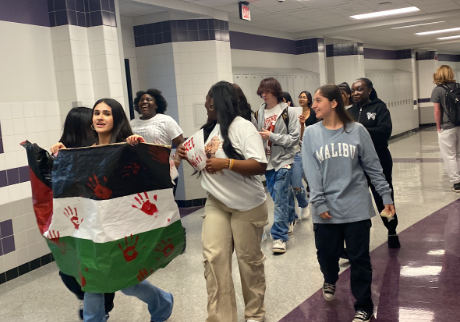


![With the AISD rank and GPA discrepancies, some students had significant changes to their stats. College and career counselor Camille Nix worked with students to appeal their college decisions if they got rejected from schools depending on their previous stats before getting updated. Students worked with Nix to update schools on their new stats in order to fully get their appropriate decisions. “Those who already were accepted [won’t be affected], but it could factor in if a student appeals their initial decision,” Principal Andy Baxa said.](https://bestofsno.com/wp-content/uploads/2024/05/53674616658_18d367e00f_o-1200x676.jpg)






![Junior Mia Milicevic practices her forehand at tennis practice with the WJ girls tennis team. “Sometimes I don’t like [tennis] because you’re alone but most of the time, I do like it for that reason because it really is just you out there. I do experience being part of a team at WJ but in tournaments and when I’m playing outside of school, I like that rush when I win a point because I did it all by myself, Milicevic said. (Courtesy Mia Milicevic)](https://bestofsno.com/wp-content/uploads/2024/06/c54807e1-6ab6-4b0b-9c65-bfa256bc7587.jpg)

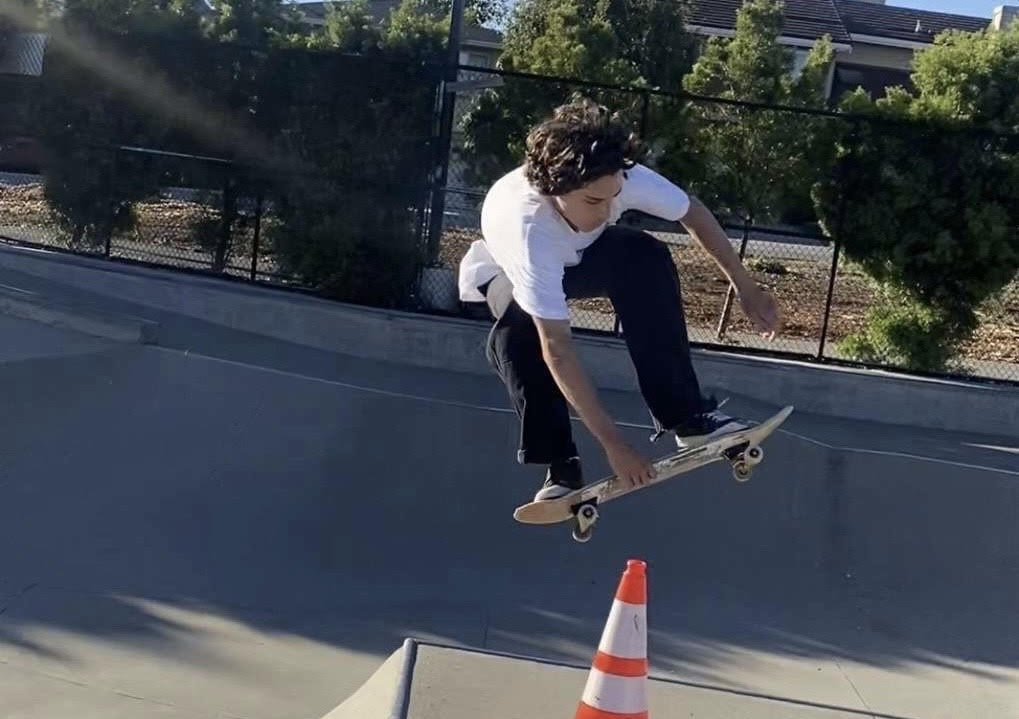
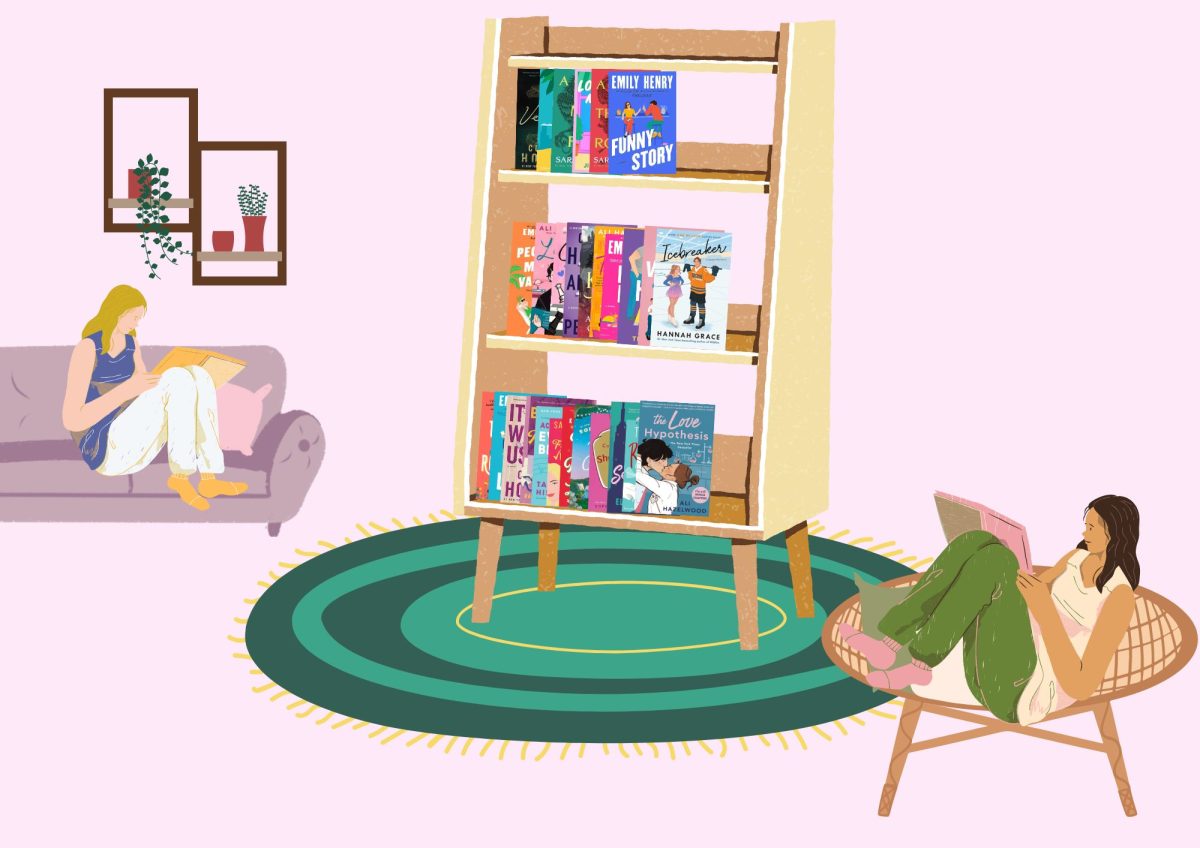


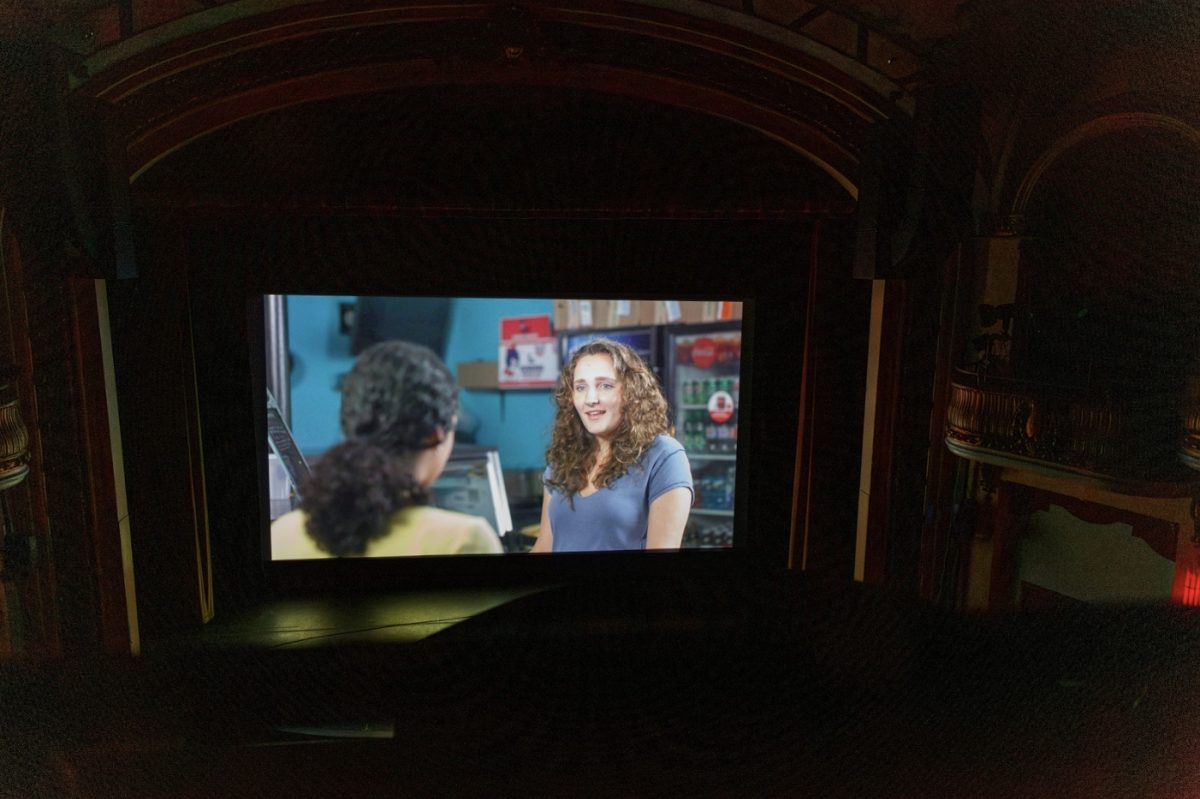

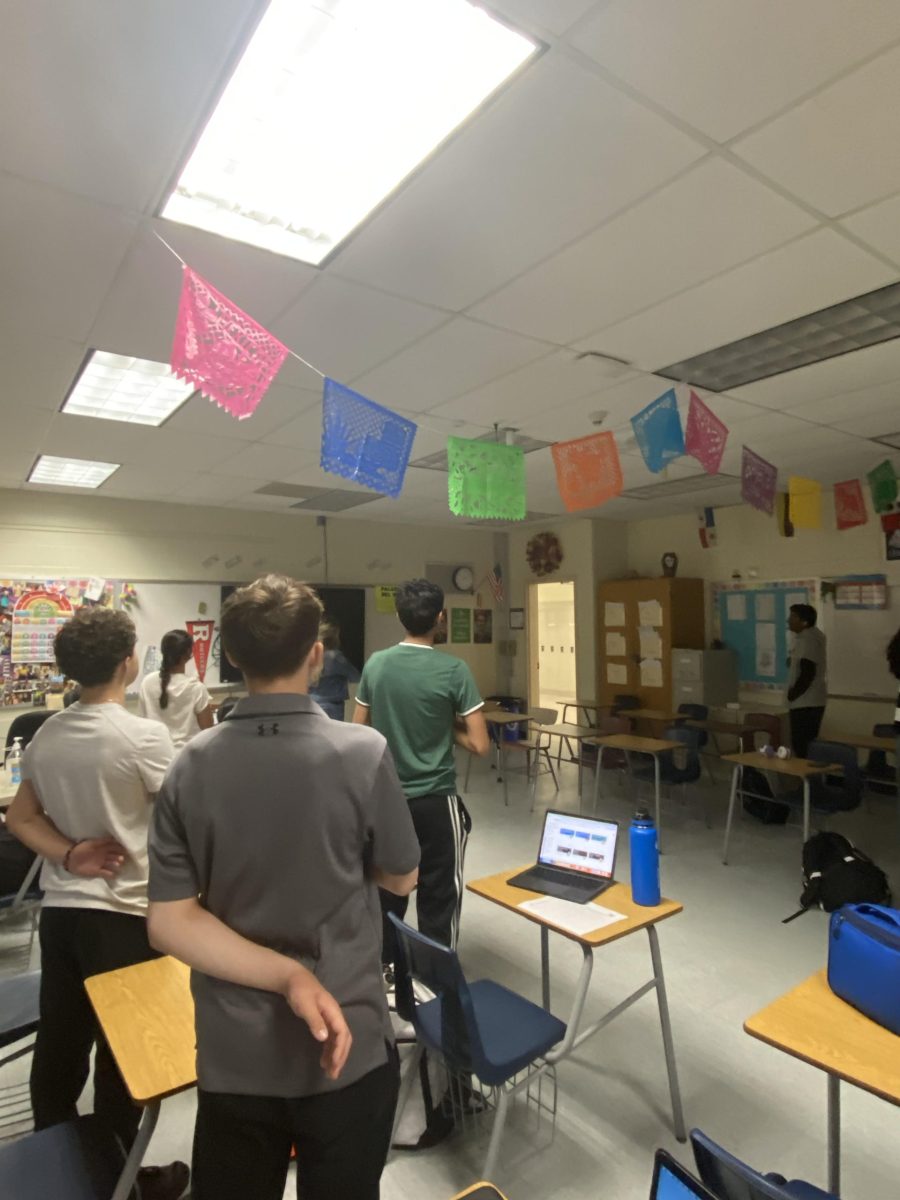
![The Jaguar student section sits down while the girls basketball team plays in the Great Eight game at the Denver Coliseum against Valor Christian High School Feb. 29. Many students who participated in the boys basketball student section prior to the girls basketball game left before half-time. I think it [the student section] plays a huge role because we actually had a decent crowd at a ranch game. I think that was the only time we had like a student section. And the energy was just awesome, varsity pointing and shooting guard Brooke Harding ‘25 said. I dont expect much from them [the Golden Boys] at all. But the fact that they left at the Elite Eight game when they were already there is honestly mind blowing to me.](https://bestofsno.com/wp-content/uploads/2024/05/IMG_7517-e1716250578550-900x1200.jpeg)


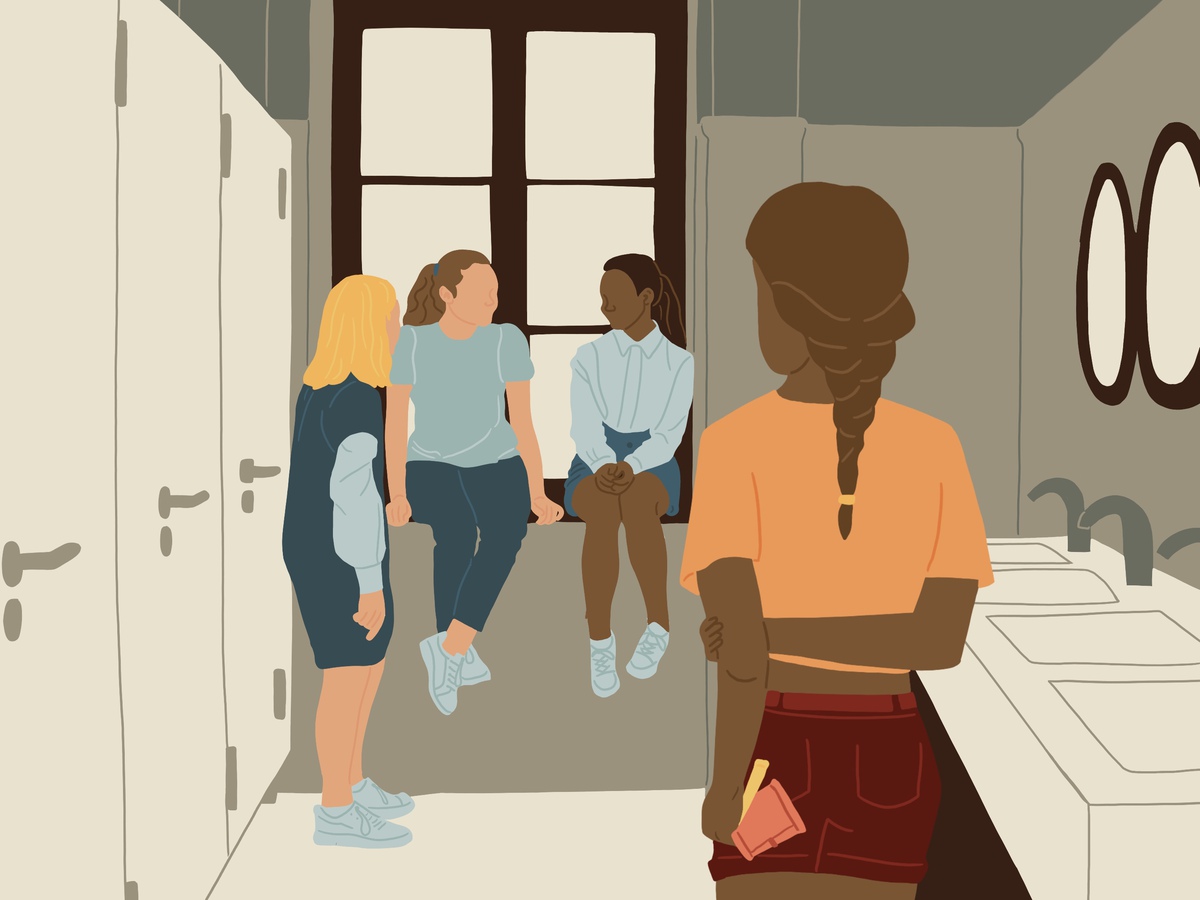



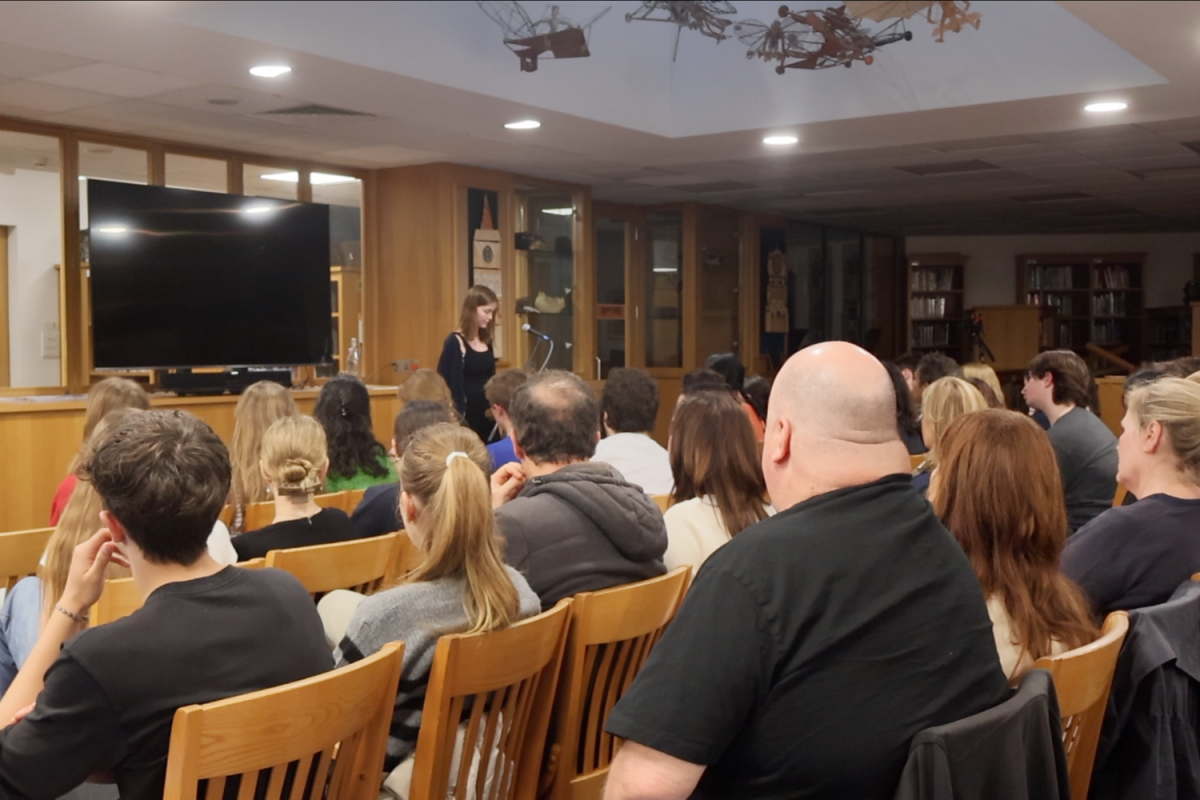

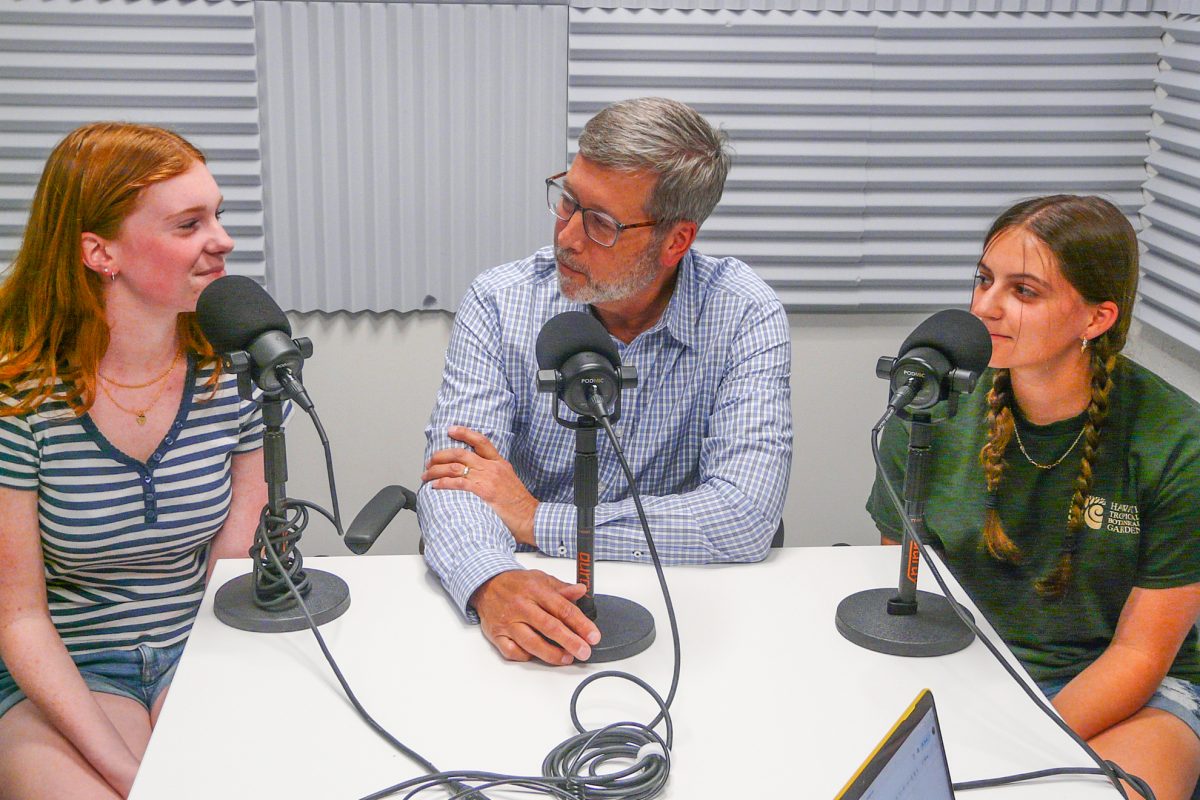
![BACKGROUND IN THE BUSINESS: Dressed by junior designer Kaitlyn Gerrie, senior Chamila Muñoz took to the “Dreamland” runway this past weekend. While it was her first time participating in the McCallum fashion show, Muñoz isn’t new to the modeling world.
I modeled here and there when I was a lot younger, maybe five or six [years old] for some jewelry brands and small businesses, but not much in recent years,” Muñoz said.
Muñoz had hoped to participate in last year’s show but couldn’t due to scheduling conflicts. For her senior year, though, she couldn’t let the opportunity pass her by.
“It’s [modeling] something I haven’t done in a while so I was excited to step out of my comfort zone in a way,” Muñoz said. “I always love trying new things and being able to show off designs of my schoolmates is such an honor.”
The preparation process for the show was hectic, leaving the final reveal of Gerrie’s design until days before the show, but the moment Muñoz tried on the outfit, all the stress for both designer and model melted away.
“I didn’t get to try on my outfit until the day before, but the look on Kaitlyn’s face when she saw what she had worked so hard to make actually on a model was just so special,” Muñoz said. “I know it meant so much to her. But then she handed me a blindfold and told me I’d be walking with it on, so that was pretty wild.”
Caption by Francie Wilhelm.](https://bestofsno.com/wp-content/uploads/2024/05/53535098892_130167352f_o-1200x800.jpg)




